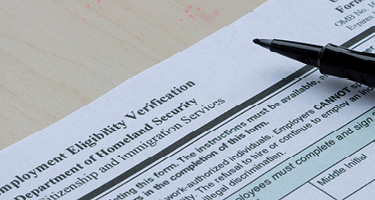The Federal Trade Commission (FTC) created waves by announcing a proposed rule in January that—if adopted and survives legal challenge—would largely prohibit employers from imposing or enforcing noncompete agreements on their workers. In a breathtaking flex of regulatory muscle, the FTC’s unprecedented proposal would create a nationwide standard that would radically modify the current landscape of restrictive covenants and significantly limit the post-termination protections currently available to many employers. Weeks later, this announcement continues to ripple throughout the business community, some of whom will no doubt seek shelter in the courts if the rule is finalized.
The proposed rule boldly follows an executive order issued by President Biden in 2021, which encouraged the FTC to exercise whatever legal authority it has to “curtail the unfair use of noncompete clauses” that “may unfairly limit worker mobility.” The concerns raised by the Biden Administration are not new: use (and abuse) of noncompetes have long created concerns and been sources of controversy. For the most part, however, the regulation of restrictive covenants has been left to the states to regulate, restrict or even outlaw, most commonly through statutory initiatives or judicial scrutiny.
- The FTC’s proposed rule would largely create a uniform federal standard, resulting in a massive change to noncompete agreement drafting, usage and practice in most states. Generally characterizing noncompete agreements as an “unfair method of competition” that violates the Federal Trade Commission Act, the FTC’s proposed rule is remarkably broad in application and scope:
- It defines “noncompete clause” as a “contractual term between an employer and a worker that prevents the workers from seeking or accepting employment with a person or operating a business after the conclusion of the worker’s employment with the employer.”
- Labeling does not matter, and workarounds will not be effective—the FTC’s noncompete definition is functional in nature and prohibits agreement terms that have the “effect” of restricting work for a competitor following the termination of employment (e.g., broadly drafted non-disclosure or non-solicit provisions).
- The proposed rule not only prohibits employers from entering into or attempting to enter into new noncompete agreements but also a) requires employers to rescind currently existing noncompete agreements and provide notice of the rescission to current and former employees and b) prohibits employers from representing that workers are subject to enforceable noncompete provisions.
- The proposed rule would cover virtually all workers, including employees, contractors and interns.
- The single current exception to the proposed rule would be limited to noncompete provisions in the context of the sale of a business for sellers who have “substantial” ownership in the sold business.
- The FTC’s proposal would create a national, relatively unified standard by superseding and preempting any inconsistent state statute, regulation or interpretation.
The proposed rule boldly follows an executive order issued by President Biden in 2021, which encouraged the FTC to exercise whatever legal authority it has to ‘curtail the unfair use of noncompete clauses’ that ‘may unfairly limit worker mobility.’”
The FTC’s proposed rule is an unprecedented expansion of the Biden Administration’s stated goal to target unfair methods of competition and faces significant hurdles before it can be promulgated or enforced. First, the proposed rule will go through the typical regulatory rulemaking process and is now subject to a 60-day comment period before it is finalized. The FTC held a virtual public forum in February to garner support for the proposed rule during the comment period by giving workers an opportunity to share their experiences with noncompetes. The comment period ended March 20, 2023. Not only could the proposed rule be modified before it is finalized, but employers are expected to have up to 180 days to comply with the final rule.
Second, the final rule, if adopted, will undoubtedly be subject to immediate legal challenges. The United States Chamber of Commerce has already mobilized resources against what it termed a “blatantly unlawful rule,” explaining that “Congress has never delegated the FTC anything close to the authority it would need to promulgate such a competition rule.” Like other recent far-reaching agency proposals and orders that have been legally challenged (e.g., OSHA’s rule regarding mandatory COVID-19 vaccinations/testing), concerned employers facing a unique administrative agency rule may have to wait for quite some time before the courts bring clarity to what is otherwise going to be a period of significant uncertainty for those who have relied on and/or used noncompetition agreements in the past.
The proposed rule has not only stirred up controversy amongst some in the business community but has also exposed bitter divisions within the FTC. Christine Wilson, a Republican appointee to the FTC, publicly announced her intention to resign in February, citing the FTC’s “disregard for the rule of law and due process.” Her resignation specifically noted that the proposed rule far exceeds the authority granted to the FTC by Congress.
Even if the proposed rule is withdrawn or a final rule is struck down, the environment is ripe for significant state or federal action on curbing or even prohibiting certain noncompete provisions. At least one bill—the Workforce Mobility Act—has garnered bipartisan support in both the United States Senate and House of Representatives. Proponents of this bill expressed the same concerns as those raised by the FTC and, like the proposed FTC rule, this bill would create a similar federal, nationwide standard governing and substantially eliminating the use of noncompete provisions in most contexts.
The FTC announcement also follows recent statutory action in several states (e.g., Colorado, Massachusetts and Washington, D.C.) that have significantly curbed the use of noncompete agreements, primarily banning businesses from requiring noncompetes for lower-income or hourly workers and creating specific requirements before noncompetes can be valid. Regardless of what happens with the FTC proposal, the publicity surrounding the announcement is expected to spur significant legislative activity in several states to further regulate or restrict the impact of noncompete agreements. Multistate employers who use noncompete agreements are going to face inevitable and evolving legal challenges drafting and enforcing these restrictive covenants.
The FTC’s proposed rule on noncompetes has amplified an area of the law that has long been subject to change and evolving standards. In the meantime, employers are counseled to take familiar steps: review existing agreements, consider what alternative contract provisions should be used in lieu of noncompetition provisions and be prepared to implement and review existing and future agreements to be compliant with applicable law. A cautious employer may want to reconsider offering additional consideration or bonuses to get employees to sign new restrictive covenants because the contemplated ban under the proposed FTC rule may not warrant a significant investment in getting new noncompete agreements executed. Otherwise, employers should shore up the protection of their trade secrets and confidential information, knowing that other restrictive covenants may not be available to them. Knowing now that key employees can work for competitors in the future may inform some employers to take additional steps to protect sensitive and confidential business information.
Mark Bakker is a recognized employment law litigator and trusted legal advisor in employment and other business-related matters. He represents clients in federal and state courts throughout North and South Carolina, arbitration panels, before the Equal Employment Opportunity Commission, the South Carolina Human Affairs Commission and other state and federal agencies. He provides daily proactive advice and counseling on a variety of human resources issues to employers, including established corporations, HR consulting firms, management teams, entrepreneurs, start-up companies and staffing companies.
































